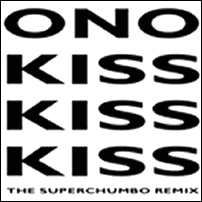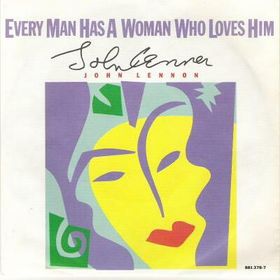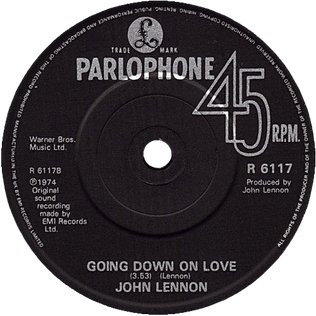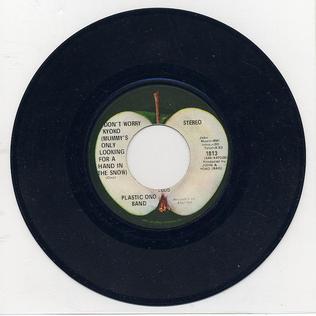
"Kiss Kiss Kiss" is a song by Japanese singer Yoko Ono. It was originally released on Double Fantasy, her joint album with John Lennon, as well as on the B-side of his "(Just Like) Starting Over" single. The disco and new wave-influenced song features Ono gasping heavily and appearing to reach orgasm.

Feeling the Space is Yoko Ono's fourth solo album, her last one on Apple Records.

"Every Man Has a Woman Who Loves Him" is a song by Yoko Ono from the album Double Fantasy with John Lennon. Other versions were released, including one released as a single where Ono's voice was removed, leaving what had been Lennon's backing vocal as the primary vocal.
"Well Well Well" is a song by English musician John Lennon from his 1970 album John Lennon/Plastic Ono Band. The eighth and longest track on the album, "Well Well Well" features an aggressive guitar sound, screaming vocals and a pounding backing track.

"My Mummy's Dead" is the closing song on the album John Lennon/Plastic Ono Band by John Lennon. The song was also released on a Mexican EP that also contained "Mother", "Isolation" and "Look at Me".

"Going Down on Love" is a song by John Lennon, released as the first track on his 1974 album Walls and Bridges. It was also released as the B-side of Lennon's "Jealous Guy" single in 1985.

"I'm Losing You" is a song written by John Lennon and released on his 1980 album Double Fantasy. It was written in Bermuda in June 1980, after several attempts by Lennon to call his wife, Yoko Ono, who remained in New York. The song is also available on the 1982 compilation The John Lennon Collection, the 1998 boxset John Lennon Anthology, the one disc compilation Wonsaponatime, the 2005 two disc compilation Working Class Hero: The Definitive Lennon and in 2010 for the Gimme Some Truth album. The song was also featured in the 2005 musical Lennon.

"Sisters, O Sisters", also known as "Sisters O Sisters", is a song written by Yoko Ono that first appeared on John Lennon's and Yoko Ono's 1972 Plastic Ono Band album Some Time in New York City, backed by Elephant's Memory. It was also released as the b-side to the couple's "Woman Is the Nigger of the World" single. It has been covered by a number of artists, including Le Tigre and Tater Totz.
"New York City" is a song written by John Lennon that was first released on Lennon's and Yoko Ono's 1972 Plastic Ono Band album Some Time in New York City.

"What You Got" is a song written by John Lennon that was first released on his 1974 album Walls and Bridges. It was later released as the B-side to his top 10 #9 Dream single.
"Bless You" is a song written by John Lennon that was first released on his 1974 album Walls and Bridges. It is a ballad expressing his love for his wife Yoko Ono, even though they were separated at the time. Alternative versions appeared on the compilation albums Menlove Ave. and John Lennon Anthology
"Scared" is a song written by John Lennon that was first released on his 1974 album Walls and Bridges. Alternate versions were subsequently released on the compilation albums Menlove Ave. and John Lennon Anthology.

"Touch Me" is a song written by Yoko Ono that was first released on her 1970 album Yoko Ono/Plastic Ono Band. An edited version was later released in the U.S. as the b-side to John Lennon's single "Power to the People."

"Midsummer New York" is a song written by Yoko Ono that was released as the opening song of her 1971 album Fly and also as the b-side of the single "Mrs. Lennon."

"Don't Worry Kyoko (Mummy's Only Looking for Her Hand in the Snow)" (also known as "Don't Worry Kyoko (Mummy's Only Looking for a Hand in the Snow)") is a song by Yoko Ono that was originally released by Plastic Ono Band in October 1969 as the B-side of John Lennon's single "Cold Turkey" and was later released on Ono's 1971 album Fly. Several live versions have been released, including on Live Peace in Toronto 1969 and Some Time in New York City in 1972. An early version was titled "Mum's Only Looking for Her Hand in the Snow". It has been covered by several other artists.

"Now or Never" is a song written by Yoko Ono that was first released on her 1973 album Approximately Infinite Universe. It was also the lead single off the album, backed by "Move on Fast." A remixed version of "Move on Fast" was later released as a single and reached #1 on the Billboard Dance Club Songs chart.

"Remember Love" is a song written by Yoko Ono and initially released as the B-side of John Lennon's and Ono's 1969 single "Give Peace a Chance."

"Who Has Seen the Wind?" is a song written by Yoko Ono that first appeared as the B-side of John Lennon's single "Instant Karma!" It was later issued as a bonus track on a compact disc version of the Wedding Album.

"Listen, the Snow Is Falling" is a song written by Yoko Ono and recorded by Ono and the Plastic Ono Band that was first released as the B-side of John Lennon's 1971 single "Happy Xmas ." A version of the song was later released on a reissue of Lennon and Ono's Wedding Album and was covered by Galaxie 500.

"Woman Power" is a single released by Yoko Ono. It was originally released on September 24, 1973 through Apple. John Lennon played guitar on the track in a performance that Ken Bielen and Ben Urish described as, "especially gritty." Bielen and Urish described Lennon's rhythm guitar solo as prefiguring his guitar playing on his last creative work, Ono's "Walking on Thin Ice." Lennon uses the alias "John O'Cean" for the song, possibly in reference to Ono's name translating as "Ocean Child" in Japanese. A remix version was released on August 26, 2014 through Mind Train / Twisted. It reached number six on Billboard's Hot Dance Club Play chart.
















